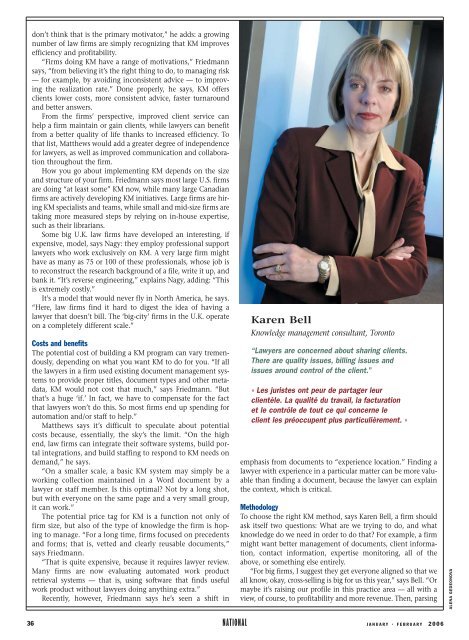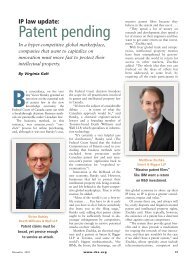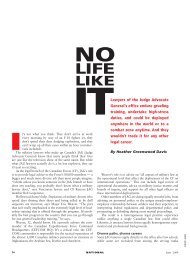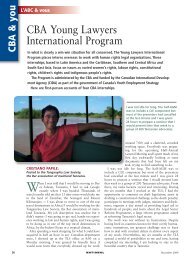The Canadian Bar Association - National (English) - July/August 2012
The Canadian Bar Association - National (English) - July/August 2012
The Canadian Bar Association - National (English) - July/August 2012
You also want an ePaper? Increase the reach of your titles
YUMPU automatically turns print PDFs into web optimized ePapers that Google loves.
don’t think that is the primary motivator,” he adds: a growing<br />
number of law firms are simply recognizing that KM improves<br />
efficiency and profitability.<br />
“Firms doing KM have a range of motivations,” Friedmann<br />
says, “from believing it’s the right thing to do, to managing risk<br />
— for example, by avoiding inconsistent advice — to improving<br />
the realization rate.” Done properly, he says, KM offers<br />
clients lower costs, more consistent advice, faster turnaround<br />
and better answers.<br />
From the firms’ perspective, improved client service can<br />
help a firm maintain or gain clients, while lawyers can benefit<br />
from a better quality of life thanks to increased efficiency. To<br />
that list, Matthews would add a greater degree of independence<br />
for lawyers, as well as improved communication and collaboration<br />
throughout the firm.<br />
How you go about implementing KM depends on the size<br />
and structure of your firm. Friedmann says most large U.S. firms<br />
are doing “at least some” KM now, while many large <strong>Canadian</strong><br />
firms are actively developing KM initiatives. Large firms are hiring<br />
KM specialists and teams, while small and mid-size firms are<br />
taking more measured steps by relying on in-house expertise,<br />
such as their librarians.<br />
Some big U.K. law firms have developed an interesting, if<br />
expensive, model, says Nagy: they employ professional support<br />
lawyers who work exclusively on KM. A very large firm might<br />
have as many as 75 or 100 of these professionals, whose job is<br />
to reconstruct the research background of a file, write it up, and<br />
bank it. “It’s reverse engineering,” explains Nagy, adding: “This<br />
is extremely costly.”<br />
It’s a model that would never fly in North America, he says.<br />
“Here, law firms find it hard to digest the idea of having a<br />
lawyer that doesn’t bill. <strong>The</strong> ‘big-city’ firms in the U.K. operate<br />
on a completely different scale.”<br />
Costs and benefits<br />
<strong>The</strong> potential cost of building a KM program can vary tremendously,<br />
depending on what you want KM to do for you. “If all<br />
the lawyers in a firm used existing document management systems<br />
to provide proper titles, document types and other metadata,<br />
KM would not cost that much,” says Friedmann. “But<br />
that’s a huge ‘if.’ In fact, we have to compensate for the fact<br />
that lawyers won’t do this. So most firms end up spending for<br />
automation and/or staff to help.”<br />
Matthews says it’s difficult to speculate about potential<br />
costs because, essentially, the sky’s the limit. “On the high<br />
end, law firms can integrate their software systems, build portal<br />
integrations, and build staffing to respond to KM needs on<br />
demand,” he says.<br />
“On a smaller scale, a basic KM system may simply be a<br />
working collection maintained in a Word document by a<br />
lawyer or staff member. Is this optimal? Not by a long shot,<br />
but with everyone on the same page and a very small group,<br />
it can work.”<br />
<strong>The</strong> potential price tag for KM is a function not only of<br />
firm size, but also of the type of knowledge the firm is hoping<br />
to manage. “For a long time, firms focused on precedents<br />
and forms; that is, vetted and clearly reusable documents,”<br />
says Friedmann.<br />
“That is quite expensive, because it requires lawyer review.<br />
Many firms are now evaluating automated work product<br />
retrieval systems — that is, using software that finds useful<br />
work product without lawyers doing anything extra.”<br />
Recently, however, Friedmann says he’s seen a shift in<br />
Karen Bell<br />
Knowledge management consultant, Toronto<br />
“Lawyers are concerned about sharing clients.<br />
<strong>The</strong>re are quality issues, billing issues and<br />
issues around control of the client.”<br />
« Les juristes ont peur de partager leur<br />
clientèle. La qualité du travail, la facturation<br />
et le contrôle de tout ce qui concerne le<br />
client les préoccupent plus particulièrement. »<br />
emphasis from documents to “experience location.” Finding a<br />
lawyer with experience in a particular matter can be more valuable<br />
than finding a document, because the lawyer can explain<br />
the context, which is critical.<br />
Methodology<br />
To choose the right KM method, says Karen Bell, a firm should<br />
ask itself two questions: What are we trying to do, and what<br />
knowledge do we need in order to do that? For example, a firm<br />
might want better management of documents, client information,<br />
contact information, expertise monitoring, all of the<br />
above, or something else entirely.<br />
“For big firms, I suggest they get everyone aligned so that we<br />
all know, okay, cross-selling is big for us this year,” says Bell. “Or<br />
maybe it’s raising our profile in this practice area — all with a<br />
view, of course, to profitability and more revenue. <strong>The</strong>n, parsing<br />
36 NATIONAL<br />
JANUARY · FEBRUARY 2006<br />
ALENA GEDEONOVA








